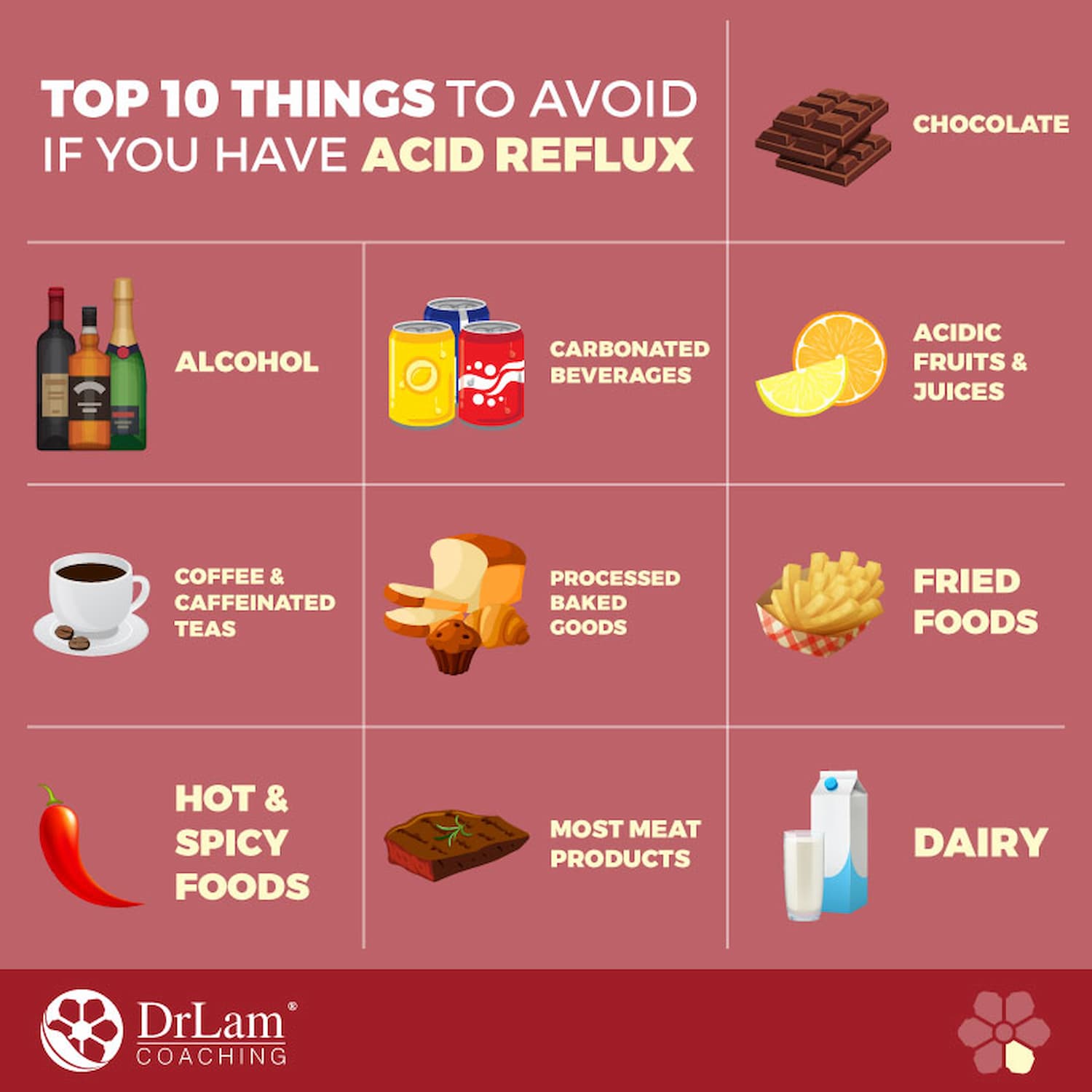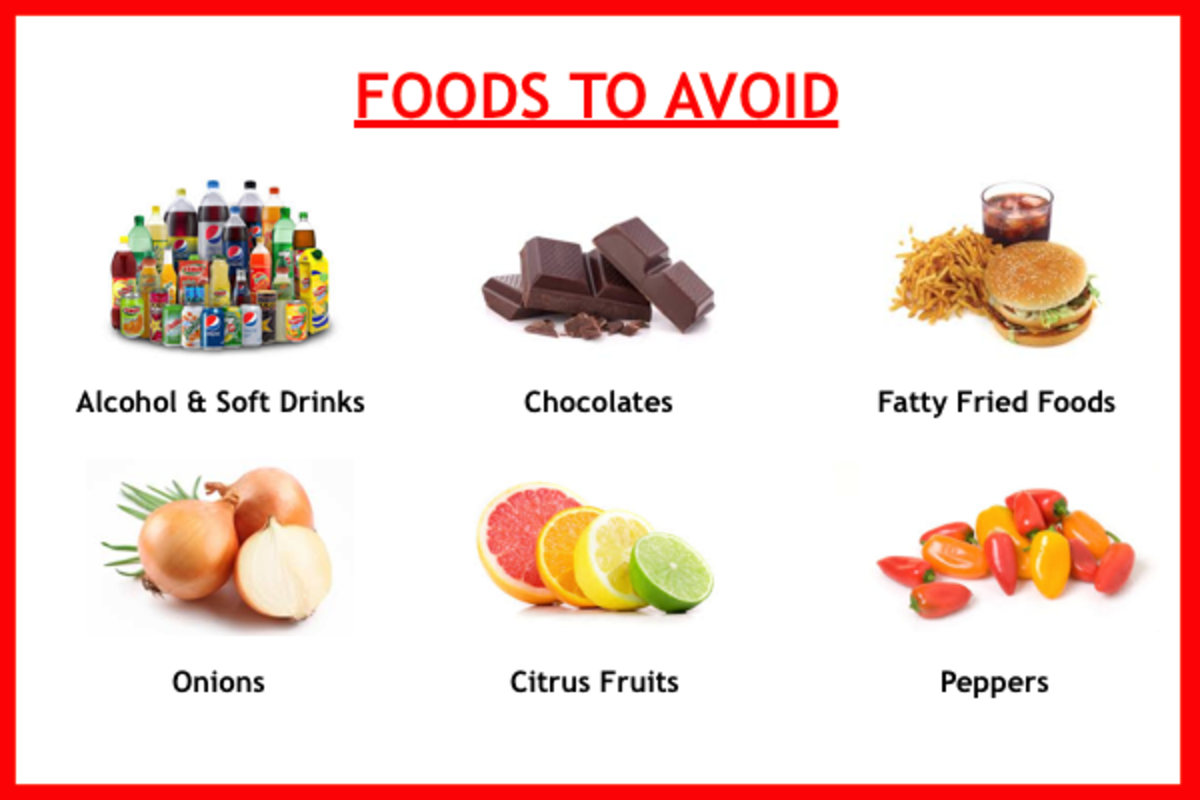Acid Reflux Foods and Drinks to Avoid
Acid reflux foods and drinks to avoid are a key part of managing this common digestive issue. Understanding which foods trigger heartburn and discomfort is crucial for finding relief. This guide explores the culprits, offering practical advice and strategies to help you navigate your diet and reclaim comfort.
From spicy dishes to acidic beverages, many everyday items can exacerbate acid reflux symptoms. We’ll delve into the science behind these triggers, providing clear examples and practical tips to help you identify and eliminate problematic foods and drinks from your diet. By making informed choices, you can significantly reduce the frequency and severity of acid reflux episodes.
Understanding Acid Reflux
Acid reflux, also known as gastroesophageal reflux disease (GERD), occurs when stomach acid flows back into the esophagus, the tube connecting your mouth and stomach. This backflow is due to a malfunction of the lower esophageal sphincter (LES), a muscular valve that typically prevents stomach contents from re-entering the esophagus. The resulting irritation causes the characteristic burning sensation.
Physiological Mechanisms of Acid Reflux
The LES’s role is crucial in preventing acid reflux. When it weakens or relaxes inappropriately, stomach acid can easily escape. Factors contributing to LES dysfunction include hiatal hernia (a protrusion of the stomach through the diaphragm), delayed stomach emptying, and increased abdominal pressure (e.g., from obesity or pregnancy).
Common Symptoms of Acid Reflux
The most common symptom is heartburn, a burning sensation in the chest. Other symptoms include regurgitation (the backward flow of stomach contents into the mouth), sour taste in the mouth, difficulty swallowing (dysphagia), and chronic cough. In severe cases, acid reflux can lead to chest pain mimicking a heart attack.
Long-Term Health Risks of Untreated Acid Reflux
Chronic, untreated acid reflux can lead to serious complications. These include esophagitis (inflammation of the esophagus), Barrett’s esophagus (a precancerous condition), esophageal strictures (narrowing of the esophagus), and esophageal cancer. Regular medical check-ups are crucial for managing and preventing these risks.
Foods and Drinks to Avoid
Certain foods and drinks can trigger or worsen acid reflux symptoms by relaxing the LES or increasing stomach acid production. Avoiding these triggers is a key element of managing the condition.
Common Food Triggers

Many foods can trigger acid reflux. The impact varies from person to person, but common culprits include:
- Fatty foods: Fried foods, fast food, processed meats, and rich desserts.
- Chocolate: Contains compounds that can relax the LES.
- Tomatoes and tomato-based products: High acidity.
- Citrus fruits and juices: High acidity.
- Spicy foods: Irritate the esophageal lining.
- Onions and garlic: Can relax the LES.
- Mint and peppermint: Relax the LES.
High-Fat Foods and Acid Reflux
High-fat foods are particularly problematic because they slow down stomach emptying, prolonging exposure of the esophagus to stomach acid. This leads to more intense and prolonged heartburn.
Acidic Beverages and Acid Reflux
Citrus juices (orange, lemon, grapefruit), carbonated drinks, and even some fruit juices contain high levels of acid, directly irritating the already sensitive esophageal lining. These should be limited or avoided.
Caffeinated Beverages and Acid Reflux
Coffee, tea, and other caffeinated beverages can stimulate acid production and relax the LES, contributing to acid reflux. Decaffeinated options may be better tolerated.
Spices and Herbs that Irritate the Esophagus
Many spices and herbs, including chili powder, black pepper, and cayenne pepper, can irritate the esophagus and worsen acid reflux symptoms.
Categorized List of Foods and Drinks to Avoid
For easy reference, here’s a categorized list:
- Fruits: Citrus fruits (oranges, lemons, grapefruits), tomatoes.
- Vegetables: Onions, garlic.
- Dairy: Full-fat dairy products (can be problematic for some).
- Grains: Some processed grains.
- Proteins: Fatty meats, processed meats.
- Sweets: Chocolate, high-sugar desserts.
- Drinks: Carbonated beverages, alcoholic beverages, caffeinated beverages, citrus juices.
Dietary Strategies for Managing Acid Reflux
Dietary changes are crucial in managing acid reflux. This involves not only avoiding trigger foods but also adopting strategies to promote healthy digestion.
Sample Weekly Meal Plan
A sample meal plan would focus on lean proteins, whole grains, low-fat dairy (if tolerated), and plenty of non-acidic fruits and vegetables. Portion sizes should be moderate. A registered dietitian can help create a personalized plan.
Portion Control Techniques
Eating smaller, more frequent meals helps prevent the stomach from becoming overly full, reducing pressure on the LES. Avoid overeating.
Adapting Cooking Methods
Steaming, baking, and boiling are gentler cooking methods than frying, which adds extra fat and can exacerbate acid reflux.
Maintaining a Healthy Weight
Excess weight increases abdominal pressure, worsening acid reflux. Weight management through diet and exercise is beneficial.
Lifestyle Modifications for Relief
Besides dietary changes, several lifestyle adjustments can significantly improve acid reflux symptoms.
Maintaining Upright Posture After Meals
Staying upright for at least two to three hours after meals helps prevent stomach acid from flowing back into the esophagus. Avoid lying down immediately after eating.
Eating Smaller, More Frequent Meals
Smaller meals prevent the stomach from becoming overly full, reducing pressure on the LES and minimizing reflux.
Managing Stress and Anxiety
Stress and anxiety can worsen acid reflux symptoms. Relaxation techniques such as yoga, meditation, or deep breathing exercises can help manage stress.
Effective Weight Management Strategies
Maintaining a healthy weight reduces abdominal pressure, lessening the likelihood of acid reflux. A combination of diet and exercise is crucial.
Lifestyle Changes to Alleviate Acid Reflux
A list of lifestyle changes might include: eating smaller meals, avoiding trigger foods, maintaining a healthy weight, quitting smoking, elevating the head of the bed, managing stress, and wearing loose-fitting clothing.
When to Seek Professional Medical Advice: Acid Reflux Foods And Drinks To Avoid
While lifestyle changes and dietary adjustments can manage many cases of acid reflux, some situations require professional medical attention.
Warning Signs Requiring Medical Attention
Warning signs include persistent or worsening heartburn, difficulty swallowing, unintentional weight loss, vomiting blood, or black, tarry stools. These may indicate serious complications.
Potential Complications of Untreated Acid Reflux, Acid reflux foods and drinks to avoid
Untreated acid reflux can lead to esophagitis, Barrett’s esophagus, esophageal strictures, and esophageal cancer. Prompt medical attention is crucial.
Medical Treatments for Acid Reflux
Medical treatments include antacids, H2 blockers, proton pump inhibitors (PPIs), and in severe cases, surgery.
Sioux Falls has a surprisingly vibrant food scene! Check out this awesome guide to ode to food and drinks sioux falls sd for some great local recommendations. Speaking of drinks, it’s interesting to consider the sources of caffeine in our daily lives; a quick look at caffeine foods and drinks will surprise you with how many unexpected sources there are.
From coffee to chocolate, it’s everywhere!
Questions to Ask a Doctor
Questions to ask a doctor might include: What are the best treatment options for my specific case? What are the potential side effects of the medication? How can I manage my symptoms effectively? What long-term complications should I be aware of?
Planning a trip to Sioux Falls? You’ll definitely want to check out the amazing food scene! For a comprehensive guide to the best eats and drinks, I recommend browsing this fantastic resource: ode to food and drinks Sioux Falls SD. Speaking of drinks, be mindful of your caffeine intake, especially if you’re sensitive. Knowing which foods and drinks contain caffeine is key, and you can find a helpful list here: caffeine foods and drinks.
Proper planning ensures a fun and energized trip!
Alternative and Complementary Therapies
While some alternative therapies, such as herbal remedies, may offer some relief, they are not a substitute for medical advice and should be used with caution and under the guidance of a healthcare professional. Their effectiveness varies, and some may interact negatively with medications.
Potential Benefits and Limitations of Alternative Therapies
Some individuals report relief from certain herbal remedies, but scientific evidence supporting their effectiveness is often limited. Always consult a doctor before using any alternative therapies.
Relaxation Techniques for Stress Management
Relaxation techniques, such as yoga, meditation, and deep breathing exercises, can help manage stress, a known trigger for acid reflux.
Importance of Consulting a Healthcare Professional
It is crucial to consult a healthcare professional before using any alternative therapies for acid reflux, to ensure safety and avoid potential interactions with other medications or underlying health conditions.
Mythbusters: Common Misconceptions about Acid Reflux
Several misconceptions surround acid reflux. Understanding the facts is crucial for effective management.
Common Misconceptions and Factual Information
Misconceptions such as “acid reflux is just heartburn” or “all acid reflux is caused by diet” are inaccurate. Acid reflux can have various causes, and its symptoms can range widely. Reliable information should be sought from credible sources, such as healthcare professionals and reputable medical organizations.
Importance of Seeking Reliable Information

Always rely on credible sources like your doctor, registered dietitian, and reputable medical organizations for information on acid reflux management. Avoid self-treating based on unreliable sources.
Successfully managing acid reflux often involves a combination of dietary adjustments and lifestyle changes. By carefully considering the foods and drinks you consume, and by incorporating the strategies discussed, you can significantly improve your comfort and well-being. Remember, consistency is key; small, sustainable changes can make a big difference in managing your acid reflux.
Share this content:
